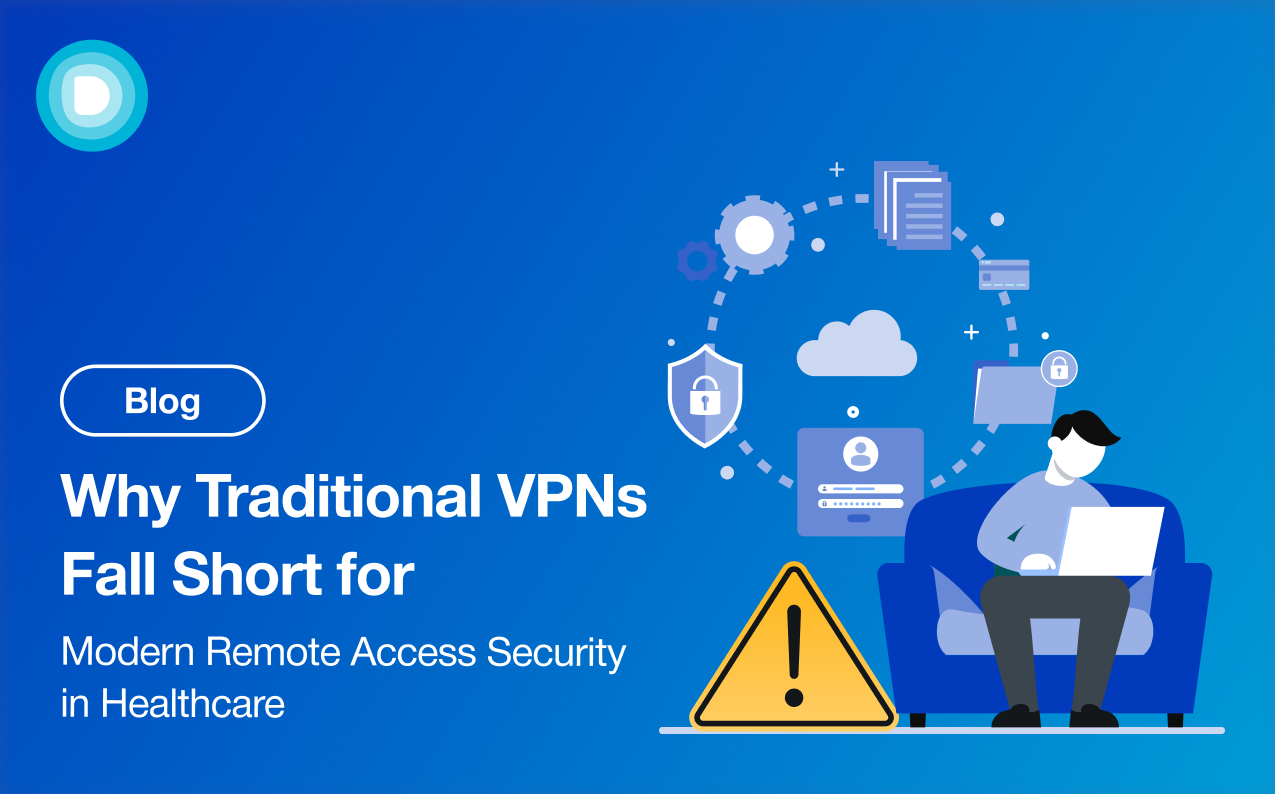- Product
-
Solution
-
By Industry
Cybersecurity solutions tailored to your industry’s needs.
-
- Resources
-
Books
Our ultimate guides and playbooks
Solution Briefs
Overview of PureDome’s functionality
-
Quizzes
Assess your cybersecurity readiness
Case Studies
PureDome customer success stories
Newsletter
Subscribe to the PureDome newsletter
-
- About Us
- Partner
- Pricing
- Download
Why Traditional VPNs Fall Short for Modern Remote Access Security in Healthcare
-
Aiman Ikram
-
18 Apr 2025
- 2 min read

Imagine this: A doctor urgently needs access to a patient’s medical records from home. The VPN connection is slow. It drops. They try again. Still no luck. Meanwhile, critical decisions are delayed.
This isn’t just frustrating—it’s risky. In healthcare, seconds matter, and so does security. Yet, many hospitals and clinics are still relying on traditional VPNs for remote access. And that’s a problem.
Because VPNs were never designed for this level of security and efficiency. Healthcare has changed, but VPNs? Not so much.
Why Traditional VPNs Struggle in Healthcare
Healthcare IT isn’t just about keeping data safe. It’s about balancing security with seamless access—so doctors, nurses, and administrators can do their jobs without roadblocks. But here’s where traditional VPNs hit a wall:
- Speed vs. Security Trade-Off – The more security layers added to a VPN, the slower it gets. Healthcare professionals don’t have time for sluggish connections.
- Single Entry Point Weakness – Once a hacker gets in, they can move freely inside the network. Not great for protecting patient data.
- Device Limitations – Traditional VPNs often struggle to integrate with multiple devices—phones, tablets, and workstations—all used in healthcare.
- Compliance Risks – With regulations like HIPAA, weak access controls can mean hefty fines and data breaches.
The Complexity of Healthcare Remote Access
Not all remote access security needs in healthcare are the same. Different users require different levels of security and permissions. And that’s where traditional VPNs fall flat.
|
User Type |
Remote Access Needs |
|
Doctors & Specialists |
Secure, fast access to patient records from multiple locations |
|
Administrative Staff |
Handles billing, insurance, and scheduling with different system access |
|
Third-Party Vendors |
Controlled access to IT support, medical devices, and insurers |
A one-size-fits-all VPN solution just can’t handle this complexity.
Read up more on secure remote access in healthcare here.
The Rising Threat of Cyberattacks in Healthcare
Healthcare data is worth 50 times more than credit card data on the black market. That’s why cybercriminals love targeting hospitals and clinics. And VPNs aren’t built to stop them.
- Ransomware Attacks Are Surging – 60% of healthcare organizations suffered a ransomware attack in 2023. VPN vulnerabilities were a key entry point.
- Phishing & Credential Theft – Once a hacker steals a VPN login, they can bypass security layers designed to protect patient data.
- Outdated Encryption – Many traditional VPNs use old encryption standards, leaving data exposed to modern threats.

Healthcare providers can’t afford these risks. So, what’s the alternative?
A Smarter Approach to Remote Access Security
Traditional VPNs have had their time. But now, hospitals and clinics need Zero Trust Network Access (ZTNA) and Dedicated IP solutions to stay secure. These solutions work differently:
- Granular Access Control – Users get access only to what they need—nothing more.
- Stronger Identity Verification – Multi-factor authentication (MFA) ensures only the right people can log in.
- Better Performance – Secure, direct access without bottlenecks and slow VPN tunnels.
Learn more about ZTNA implementation here.
How PureDome Enhances Healthcare Remote Access Security
Healthcare IT teams need more than just another VPN for their network security. They need a scalable and secure remote access solution. That’s where PureDome comes in.
- Dedicated IPs for Healthcare Teams – This ensures secure, consistent access for doctors and staff.
- Zero Trust Security Framework – Reduces attack surfaces and prevents unauthorized access.
- Seamless Integration – Works across multiple devices without slowing down workflows.
- Compliance-Ready Security – Helps healthcare organizations meet HIPAA and other regulatory requirements.
With healthcare cyberattacks on the rise, relying on outdated VPNs isn’t just inconvenient—it’s a liability. Secure, efficient remote access is possible. And PureDome makes it happen.
Want to learn more about how PureDome can strengthen your healthcare security? Explore solutions here.